Primary navigation
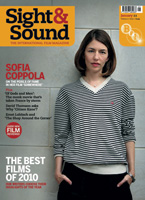
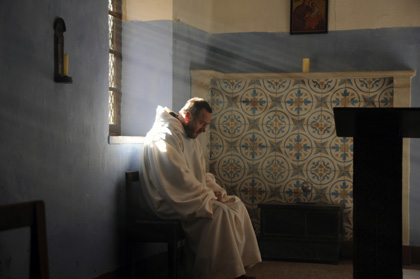
Based on the true story of a group of monks in Algeria, Of Gods and Men is one of several recent films to examine links between French and Islamic culture. But it’s the film’s evocation of the monks’ inner state that really resonates, says Jonathan Romney
The title of Xavier Beauvois’s second feature as director was Don’t Forget You’re Going to Die (N’oublie pas que tu vas mourir, 1995). That could also serve as a motto for his latest film Of Gods and Men (Des Hommes et des dieux), a drama that was one of the critical successes of Cannes this year, where it won both the Grand Prix and the Ecumenical Award. The film has recently become – improbably, you might think, given its sombre theme and execution – a major box-office success in France. Like Beauvois’s earlier film, Of Gods and Men is concerned with mortality – with the inevitability of death and the appropriate attitude with which it should be met.
Although this is something we learn only in the closing titles, Of Gods and Men is based on the 1996 kidnapping and killing of seven Cistercian monks from the monastery of Tibhirine in Algeria, during that country’s civil war. An Islamic extremist group is believed to have abducted and killed the French monks; their severed heads were found, but not their bodies (the film doesn’t mention this, perhaps so as not to close on a sensationalist note).
The story offers every prospect for a tense hostage narrative, a fraught analysis of French-Algerian relations, a from-the-headlines drama of the Costa-Gavras school. However, Beauvois and collaborator Etienne Comar – the film’s co-writer and producer, who originally approached the director with his script – choose a different approach. They focus on events prior to the catastrophe, and on everyday life in the monastery, creating what is primarily a low-key drama of interiors and interiority. The film is set largely within the monastery, with the monks appraising their situation as their adopted country is beset by violent conflict and extremist attacks on civilians, Algerian and foreign alike. The monks – exiles rather than missionaries, and in no way proselytisers for Christianity – must choose between staying or fleeing. They must ask themselves whether it makes more sense to save their own lives by departing, or whether it behoves them – not just as holy men, but as men – to stand firm in the face of almost certain death.
This might suggest a tendentious debate on moral courage, specifically Christian and specifically male – one of those films that emphasise the masculinity of the priest as conflicted hero (see Melville’s Léon Morin, prêtre (1961), or Pialat’s Sous le soleil de Satan (1987)). In Beauvois’s film, however, maleness exists in the context of a desexualised male communality, under the sign of fraternity. In interviews, Beauvois has said that the film’s essential theme is “liberté, égalité, fraternité” – the secular Holy Trinity of the French Republic.
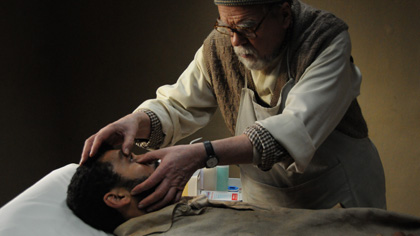
Of the three, liberty is the most explicitly invoked, notably by the monastery’s resident medic Brother Luc (the veteran Michael Lonsdale), who comments, “I’m not scared of terrorists, even less the army. I’m not scared of death, I’m a free man.” Luc sounds a note both historical and theological when he comments that in his long history as a doctor, he has had dealings with all sorts, including Nazis and even the Devil.
Implicit in the secular trinity of values is the ideal of solidarity. A central – and problematic – issue is the matter of these Christians’ involvement and identification with Algeria, and with the values of Islam. The parallelism between the two religions is discussed explicitly, but is first signalled very subtly early on in the film when, after the monastery’s early-morning service, we hear the faint but distinct voice outside of the muezzin’s call to prayer.
From the start, the film stresses the cordial kinship between the monks and the Algerian mountain community in which they have settled. Early on, the monks are invited to a celebration in the village, and wholeheartedly join in Islamic prayers. The monastery’s abbot is a scholarly theologian named Christian (Lambert Wilson), on whose desk we see copies of the writings of St Benedict and St Francis – and the Koran. Christian feels a potent intellectual and spiritual bond with Islam. Early in the film, he and Luc visit two Algerian friends, village elders who express their shock about the extremist violence in Algeria – specifically the story of an 18-year-old girl stabbed for not wearing hijab. Christian says his monks will pray for the girl, adding, “Inshallah.” What’s crucial is the monks’ solidarity with their host culture, and adoption of its words of faith.
Soon afterwards, a group of armed mujahideen arrive at the monastery demanding that Luc come to tend a wounded man. Christian calmly refuses – Luc is old, and their medicine belongs to the village. He also makes a contentious move, which is to cite the Koran – he asks the armed men if they know the verse that states, “Priests and monks… they wax not proud.” It could be read as a sign of presumption to quote the Koran at Muslims, but Christian means to establish a shared language and set of beliefs. He also explains that it is Christmas, when his religion celebrates the birth of its own ‘Prince of Peace’. The mujahideen leader Ali Fayattia (Farid Larbi) offers Christian his hand, and leaves in peace.
When Christian declines an offer of protection from the Algerian army, his refusal occasions a debate in the monastery, one brother objecting that, by making decisions on everyone’s behalf, Christian has undermined the principle of community. Christian also finds himself at odds with the otherwise sympathetic local official who makes no bones about blaming French colonialism for the parlous state of his country. The official hands over an order from Algeria’s Ministry of the Interior, demanding that the monks leave the country; again, Christian refuses.
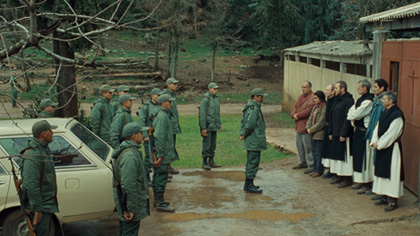
Later, an army commander accuses Christian of being indulgent with the rebels; he tells Christian that his men have dragged the dead Fayattia along the ground behind a truck (one of the violent incidents referred to in the film, although the only one shown is the murder of some Croatian workers). The commander asks Christian to identify Fayattia’s body, which the monk does, joining his hands in prayer – at which point the soldier makes a gesture of dismissive contempt. The army has become as much a menace as the guerrillas, and indeed (although it’s never referred to in the film) there have been suspicions that the Algerian army played a part, accidental or otherwise, in the monks’ eventual death. (I haven’t read it, but there is a book-length account of the case, The Monks of Tibhirine, by American journalist John W. Kiser.)
The decision facing the monks is a complex and painful one. There are matters of social responsibility to consider. For the monks, helping the local community is an essential part of their raison d’être; they dispense medical care, social assistance and, presumably, provide work and income for the villagers with their cultivation of honey. Their friends in the village certainly want the monks to stay, telling them that they help ensure order and stability.
There are more abstract reasons to consider too. The pressing question becomes one of courage, resistance, principle – all motives that might be subsumed, for a religious believer, under the heading of faith. The monks are initially divided on the question; among them, Brother Christophe (Olivier Rabourdin) is the most tormented. In his dark night of the soul, he is seen alone, praying and calling out, “Help me, help me,” while his fellows listen in distress from their own cells. The film stresses that, while the brothers form a collectivity, each must make his decision utterly alone. No ‘we’re there for you buddy’ cosiness here – souls are searched in appropriately austere manner.
Christophe’s troubles approach resolution in a later scene with Christian, who tells him that, in entering the order, “You’ve already given your life.” Etienne Comar has cited Kurosawa’s Seven Samurai (1954) – of all films – as a model for Of Gods and Men, but it makes sense. Traditionally, the proper comportment for the samurai is to act as if he were already dead, and this is the challenge facing the spiritual samurai of the Tibhirine monastery.
Essential to the film’s style, shape and tone are several scenes that could be regarded either as interludes in the action or as its essential moments, in which the monks chant together in the Cistercian liturgical ritual (the actors themselves sing, with severe beauty). These passages are solemn, still, photographed by Caroline Champetier so as to merge the men rather than framing them as individuals; seen side on, from behind, they are a collective being voicing a communal soul. These scenes allow the viewer – and the characters – periods of mental repose, during which to contemplate the action and its issues with calm detachment. At the same time, we understand that the singing is an integral part of the monks’ daily work – part of the work of producing a community.
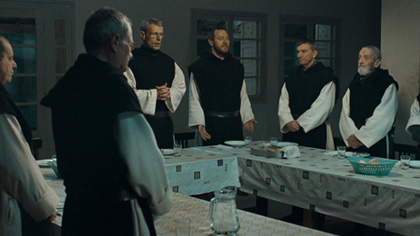
The meaning of that work becomes clear when an army helicopter flies over the monastery – a scene shot partly from the POV of a hypothetical soldier peering over a gun. As the chopper flies over, its martial noise threatening to drown out the prayers, the monks for the first time look up, turn and – their arms around each other – sing in an act of peaceful symbolic resistance.
Chanting apart, the film eschews music; Beauvois refuses to impose rhetorical commentary with a score. There is one moment, however, when music is used very potently. Comar’s original script had a scene near the end in which the monks sing Jacques Brel while washing up. He and Beauvois opted instead to have the monks gather at table – one of two scenes in which the framing explicitly evokes the placement of the disciples at Leonardo’s Last Supper. Luc enters with wine and surprises his fellows by switching on a cassette player, which fills the room with music from Swan Lake.
Initially bemused, the monks exchange smiles at this secular blessing. Each is seen in close-up, silently musing on their situation – some with gentle smiles, others with signs of dread, all seemingly with resignation. Their thoughts are simply suggested through the actors’ more or less muted facial expressions, in a sublime testimony to the eloquence of the wordless close-up. It is the dinner scene that seals the viewer’s bond with the monks, drawing the audience into these men’s intimate community (one reason why the film needs to be seen in a cinema). Beauvois boldly strikes a delicate balance, risking kitsch with this depiction of devout men relishing the almost corny rapture of a classical greatest hit (but then, what do you think monks listen to –Stockhausen?).
The film’s ability to evoke inner states is partly a result of superb actors astutely cast, partly for their looks: Lambert Wilson, with his bony, delicately pensive physiognomy; the placid, gnome-like features of the venerable Jacques Herlin, as Amédée; the rougher, ordinary-man looks of Rabourdin’s Christophe; and Lonsdale’s face, that ragged monument of French cinema, with its historical traces of sensual worldliness. (Beauvois chose to strip out Comar’s original back stories, but Luc’s remains in part: listening to a young village woman’s worries about love and marriage, he confesses that he knew earthly love many times before finding his vocation.)
Of Gods and Men comes as a departure in the career of a gifted filmmaker who has previously been nothing if not earthly. Beauvois’s last film as director was the realist police drama Le Petit lieutenant (2005), while Selon Mathieu (2000) – despite its quasi-religious title – was about a man seducing his boss’s wife as an act of revenge. His only film previously released in Britain was his second, Don’t Forget You’re Going to Die, a powerful if narcissistic existential drama in which Beauvois himself took the lead role of a man facing his mortality in the shape of Aids and drugs. (Also a frequent actor in other directors’ films, Beauvois was most recently seen by UK audiences opposite Isabelle Huppert in Benoît Jacquot’s Villa Amalia.)
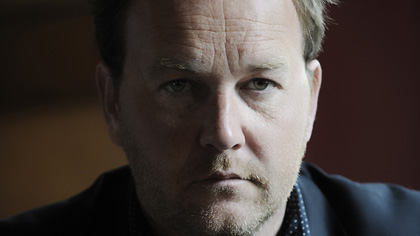
Xavier Beauvois
What impresses about his new film is its clear-minded detachment – the classicism and modesty of its style. Avoiding overt rhetoric, it neither imposes a clear moral or political meaning on events, nor overstresses the dignity of its characters. We see the monks doing what they do not because of some ineffable nobility (still less divinity), but because praying, questioning themselves and sacrificing themselves come with their job. They are no more glorified than career soldiers would be in an equivalent film about the army; devotion is a part of professional commitment, even though that commitment may lead to extreme places. This is, you might say, the monastic equivalent of The Hurt Locker.
Of Gods and Men gives ample scope for theological debate – a key passage, foreshadowing the monks’ diverse fates, quotes Matthew 24:40, “One shall be taken and the other left.” (Two monks of Tibhirine were indeed spared.) But the filmmakers have particularly stressed a secular, loosely political purpose: Comar has said that the film is more “a message of peace and friendship between France and Algeria than a discourse about colonialism”. This is largely the spirit in which it has been received, although a dissenting note was struck by Libération’s Didier Péron: he questioned the lack of an explicitly political perspective, in the light of which the monks’ position might more clearly appear as “unctuous paternalism”. Certainly, the film’s commercial success would suggest that audiences find its themes as reassuring as they are challenging. Along with its message of tolerance and courage, it offers similar contemplative pleasures to another unexpected arthouse hit – Into Great Silence (Die grosse Stille, 2005), Philip Gröning’s documentary about a Trappist monastery.
But from a more political perspective, Of Gods and Men also belongs in a context of cinematic debate on the role of Islam and Arab culture in contemporary France. In Cannes, the film competed alongside Outside the Law (Hors la loi), Rachid Bouchareb’s rousingly angry celebration of the undercover guerrillas of the FLN, fighting for Algerian independence in 1950s-60s France – pitched as a conventionally thrilling action drama. Last year, Jacques Audiard’s A Prophet (Un Prophète) groundbreakingly depicted the rise of an Arab gangland antihero (and controversially, showed him exploiting Islamic identity for personal advancement). Then there’s Hadewijch (screened at the LFF in 2009, but yet to be released in the UK), Bruno Dumont’s perverse and confrontational drama about a disillusioned nun – a film that can be seen as assertively anti-religious in its equation of Catholic and Islamic extremisms. In a wider post-colonial perspective, Of Gods and Men also resembles Claire Denis’s more impressionistic and ambivalent White Material, another story of outsiders who refuse to leave a country in turmoil – although Isabelle Huppert’s protagonist is more overtly a colonial hangover, determined to squeeze the last drop of comfort (or coffee) from a country that no longer wants her around.
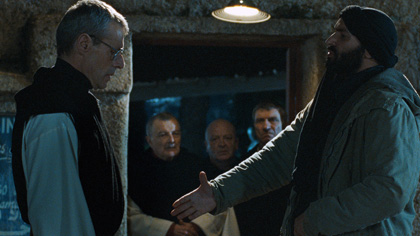
In White Material, French and Africans alike find their crises culminating in a mass collapse into violence, even insanity – perhaps, for Denis, the only conceivable outcome of the relationship between colonialist and colonised. In Of Gods and Men, something else is at stake. However out of place they seem in modern Algeria, the monks aspire to replace and correct colonialism with a benign post-colonialism, in which the outsider remains as guest, helper, kin. One can see how this position might serve to cover a more duplicitous exploitation – Péron’s “unctuous paternalism”. Yet Christian’s closing voiceover leaves no doubt about the sincerity of his relationship to Algeria. As he anticipates meeting his maker, he mounts a defence of the Islam that he sees as misunderstood in Europe, and distorted in the Algerian conflict: “This country and Islam for me… are a body and soul… God willing, I will merge my gaze in the Father’s and contemplate with Him His children of Islam, as He sees them.”
Religious audiences may well see Of Gods and Men as a statement about modern sainthood – and certainly the film’s stylistic reserve will contribute to that, evoking a sense of austere grace in everyday life. But secular viewers will find a humanist serenity in a film that, equally avoiding the traps of piety and cynicism, speaks with simple candour for understanding – a political message that is no less urgent for the calm formal reserve with which it is conveyed by Beauvois and Comar, and by their characters. Of Gods and Men achieves a grace that, in secular terms, is best translated simply as ‘sanity’.
‘Of Gods and Men’ is released on 3 December, and is reviewed in the January issue of Sight & Sound
White Material reviewed by Catherine Wheatley (Film of the Month, July 2010)
The big wait: Tom Dawson interviews director Michael Whyte about No Greater Love, his documentary about Carmelite nuns in Notting Hill (April 2010)
Lourdes reviewed by Michael Brooke (April 2010)
Within a closed world: Jacques Audiard talks to Ginette Vincendeau about his prison drama A Prophet (November 2009)
Couscous reviewed by Ginette Vincendeau (July 2008)
Unknown soldiers: Ali Jafaar on Rachid Bouchareb’s war movie Days of Glory (April 2007)
Into Great Silence reviewed by Catherine Wheatley (February 2007)
Shimura Takashi: the last samurai: Alex Cox on Kurosawa’s other favourite actor, a restrained and underrated figure long in the shadow of the mercurial Mifune Toshiro (June 2006)
Raising hell: Mark Kermode on Ken Russell’s The Devils, based on the build-up to the public burning of Father Urbain Grandier in Loudun in 1634 (December 2002)
The Cup reviewed by Geoffrey Macnab (December 1999)
Hideous Kinky reviewed by Philip Kemp (February 1999)